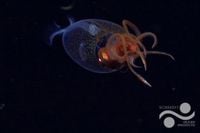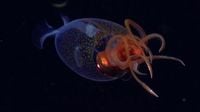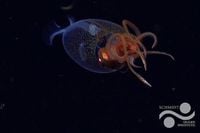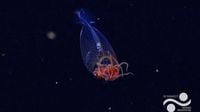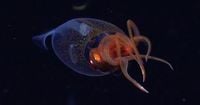In a groundbreaking discovery, scientists have captured the first-ever video footage of a juvenile colossal squid in its natural environment. This momentous event took place during a 35-day expedition led by the Schmidt Ocean Institute off the South Sandwich Islands, with the sighting occurring on March 9, 2025.
The footage reveals a juvenile colossal squid, measuring nearly one foot long and exhibiting a see-through appearance, swimming at a depth of approximately 1,100 feet (about 335 meters). This sighting is particularly significant as it marks the first time a colossal squid, scientifically known as Mesonychoteuthis hamiltoni, has ever been filmed alive in its natural habitat since its formal identification and naming a century ago.
Michelle Taylor, the chief scientist of the expedition and a professor at the University of Essex, expressed her excitement, stating, "This is a once-in-a-lifetime situation; these types of discoveries don't come along very often." The footage was captured using a remotely operated vehicle (ROV) equipped with advanced imaging technology.
Initially, the research team did not recognize the squid as a colossal. It was only when a viewer of the livestream commented on its identity that the team realized the significance of their discovery. Taylor described the moment: "When we first watched it live, it was so beautiful, so we were already quite mesmerized by this stunning little squid. Then to find out that it was something so special, that was a real beautiful moment."
Colossal squids are known to grow up to 23 feet in length and can weigh as much as 1,100 pounds, making them the heaviest invertebrates on the planet. Despite their size, they are elusive creatures, primarily known through fragments found in the stomachs of their only predator, the sperm whale.
Dr. Kat Bolstad, a marine biologist at Auckland University of Technology, noted the importance of this discovery, stating, "It’s exciting to see the first in situ footage of a juvenile colossal and humbling to think that they have no idea that humans exist." This sentiment highlights the mystery surrounding the species, which has been largely studied through indirect means.
In the past, encounters with colossal squids have been limited to unfortunate circumstances, such as when they are caught by fishermen or found as prey remains within the stomachs of larger marine animals. The recent footage provides researchers with an unprecedented opportunity to observe the squid's behavior and ecology in its natural setting, something that has previously been impossible.
Dr. Jyotika Virmani, the executive director of the Schmidt Ocean Institute, emphasized the significance of this find, saying, "These unforgettable moments continue to remind us that the ocean is brimming with mysteries yet to be solved." This discovery aligns with the institute's ongoing mission to explore the depths of the ocean and document the diverse life forms that inhabit it.
The expedition also holds a historical significance as it is not the first time the Schmidt Ocean Institute has captured footage of rare cephalopods. Earlier in 2024, researchers filmed the Promachoteuthis, and in 2020, they documented the Ram's Horn Squid in the wild.
The colossal squid's adaptations are remarkable. Their bodies are equipped with the largest eyes in the animal kingdom, allowing them to navigate the dark depths of the ocean. These adaptations, along with their unique physical characteristics, such as hooks on their tentacles, make them perfectly suited for life in the abyss.
As scientists continue to explore the ocean, they are reminded of the countless species yet to be discovered. The recent sighting of the juvenile colossal squid serves as a testament to the rich biodiversity that exists beneath the waves and the importance of marine conservation efforts.
Dr. Bolstad highlighted the potential for future discoveries, stating, "People want to go into space, and we have all this beautiful, uncharted territory on our own planet. There are still so many amazing, incredible things left to discover; we've only scratched the surface." This optimism underscores the potential for further exploration and the need for continued investment in oceanic research.
Overall, the sighting of the juvenile colossal squid not only provides a glimpse into the life of one of the ocean's most mysterious inhabitants but also serves as a reminder of the vast, unexplored territories that still exist in our world. As technology advances and exploration efforts continue, who knows what other wonders await discovery in the deep sea?
